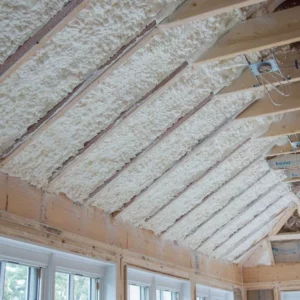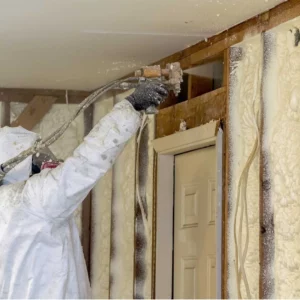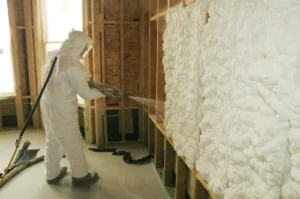
Spray foam insulation is becoming an increasingly popular choice for homeowners looking to maximize energy efficiency in their homes. With its many advantages, spray foam insulation offers a range of benefits that go beyond traditional insulation methods. In this article, we will explore the various benefits of spray foam insulation and its ideal applications for different areas of your home.
Spray foam insulation is a highly effective method of insulating your home, providing numerous advantages over traditional insulation materials. Not only does it create an airtight seal, but it also enhances indoor air quality, reaches every nook and cranny, offers long-lasting insulation solutions, provides soundproofing benefits, keeps moisture at bay, protects your home from fire, offers an eco-friendly choice, strengthens structures, and saves you money in the long run.

One of the key advantages of spray foam insulation is its ability to create an airtight seal. Unlike other insulation materials, spray foam expands to fill every nook and cranny, minimizing air leakage and preventing pollutants from entering your home. This improves indoor air quality by reducing dust, allergens, and other airborne contaminants.
With spray foam insulation, you can breathe easy knowing that your home is protected from external pollutants, creating a healthier living environment for you and your family.
Traditional insulation methods often leave gaps and spaces where heat and cool air can escape, resulting in energy loss and increased utility bills. With spray foam insulation, however, every corner and crevice is effectively sealed, preventing air leakage and ensuring consistent temperature control throughout your home.
By reaching every nook and cranny, spray foam insulation provides superior insulation performance, allowing you to enjoy a comfortable and energy-efficient home all year round.
Unlike other insulation materials, spray foam insulation is incredibly durable and long-lasting. It can maintain its insulating properties for many years, eliminating the need for frequent replacements. This not only saves you money in the long run but also reduces the environmental impact associated with disposal and production of insulation materials.
Investing in spray foam insulation means investing in a long-term insulation solution that will continue to provide energy efficiency and comfort for years to come.
Noise pollution can be a significant issue in many homes, particularly those located in busy areas or near highways. Spray foam insulation, with its sound-dampening properties, can help create a more peaceful and quiet living environment. By minimizing outside noise, spray foam insulation allows you to relax and enjoy your home without disturbances.
Whether you want to create a tranquil space for relaxation or reduce noise distractions while working from home, soundproofing spray foam insulation can make a noticeable difference in the overall comfort of your living environment.

Moisture infiltration can lead to a host of problems in your home, including mold growth and structural damage. Spray foam insulation acts as a moisture barrier, preventing water vapor from entering your home's walls and ceilings. By keeping moisture at bay, spray foam insulation helps to maintain a healthy living environment and protects your home from potential water damage.
With spray foam insulation, you can have peace of mind knowing that your home is safeguarded against moisture-related issues, ensuring the longevity and structural integrity of your property.
Fire safety is a crucial consideration for homeowners. Spray foam insulation is known for its fire-retardant properties, providing an additional layer of protection in the event of a fire. Its ability to slow down the spread of flames can buy you valuable time to evacuate and minimize property damage.
By choosing spray foam insulation, you are taking proactive steps to protect your home and loved ones from the devastating effects of fire, giving you added peace of mind.
Concerns about the environment have never been more prevalent, and homeowners are increasingly seeking sustainable solutions for their homes. Spray foam insulation offers an eco-friendly choice by reducing energy consumption and minimizing greenhouse gas emissions. By reducing your carbon footprint, spray foam insulation helps you contribute to a greener and more sustainable future.
By choosing spray foam insulation, you are not only improving the energy efficiency of your home but also making a positive impact on the environment, promoting a more sustainable way of living.
Spray foam insulation not only provides excellent thermal insulation but also enhances the structural integrity of your home. The expanding foam adheres to surfaces, creating a strong bond that can strengthen walls and roofs. This added structural support can help your home withstand external forces such as high winds and earthquakes.
With spray foam insulation, you are not only investing in energy efficiency but also in the overall strength and durability of your home, ensuring its resilience against various environmental factors.
While the initial cost of spray foam insulation may be higher than traditional insulation methods, the long-term savings are significant. By reducing energy consumption and preventing air leakage, spray foam insulation can lead to lower monthly utility bills and a quick return on investment. Furthermore, its long-lasting nature eliminates the need for frequent replacements, saving you money on maintenance and replacements over time.

Spray foam insulation is a versatile solution that offers numerous benefits for homeowners looking to maximize energy efficiency. By creating an airtight seal, it helps maintain a comfortable temperature throughout your home, prevents conditioned air from escaping, and reduces energy consumption. Let's explore some of the ideal applications for spray foam insulation in more detail.
Attics are often poorly insulated, leading to significant energy loss. Spray foam insulation can be applied directly to the attic floor and walls, creating an effective barrier against heat transfer. This not only helps maintain a comfortable temperature throughout your home but also prevents conditioned air from escaping. With spray foam insulation, you can transform your attic into a well-insulated space that contributes to energy efficiency.
Furthermore, a properly insulated attic can also provide additional benefits such as reducing noise transmission from the outside, preventing the entry of pests, and improving indoor air quality by minimizing the infiltration of dust and allergens.
The walls of your home are another key area where heat transfer can occur. Spray foam insulation can be applied inside the walls, providing an airtight seal that minimizes heat loss. This allows your heating and cooling systems to work more efficiently, reducing energy consumption and lowering your utility bills.
In addition to energy efficiency, spray foam insulation in walls can also contribute to soundproofing. It acts as a barrier to reduce the transmission of noise from outside or between rooms, creating a quieter and more peaceful living environment.
Ceilings can be a significant source of energy loss, especially in older homes or those with insufficient insulation. Spray foam insulation can be applied directly to the ceiling, creating a complete air barrier that prevents heat transfer. This helps maintain a consistent temperature in your home and reduces the strain on your HVAC system.
Furthermore, spray foam insulation in ceilings can also provide additional benefits such as improving fire resistance. It acts as a barrier that slows down the spread of fire, giving you and your family more time to safely evacuate in case of an emergency.
Basements often suffer from high humidity levels and moisture infiltration. Spray foam insulation can effectively seal off the basement walls and prevent water vapor from entering. This eliminates the risk of mold growth, protects your belongings, and creates a more comfortable living space.
In addition to moisture control, spray foam insulation in basements can also help with structural integrity. It strengthens the walls by adhering to the surface and providing reinforcement, reducing the risk of cracks or damage caused by shifting soil or water pressure.
Many homeowners overlook the insulation needs of their garage, resulting in energy loss and temperature fluctuations. Spray foam insulation can be applied to the garage walls and ceiling, creating an insulated space that keeps the area warm in winter and cool in summer. This not only improves energy efficiency but also provides a more comfortable environment for working or parking your vehicles.
Moreover, spray foam insulation in garages can also contribute to pest control. It acts as a barrier that prevents the entry of insects or rodents, keeping your garage clean and free from unwanted guests.
In conclusion, spray foam insulation offers numerous benefits for homeowners looking to maximize energy efficiency. From enhancing indoor air quality and soundproofing to preventing moisture infiltration and adding structural integrity, spray foam insulation is a versatile and effective solution. By understanding its advantages and ideal applications, you can make an informed decision and create a more comfortable, energy-efficient home environment.